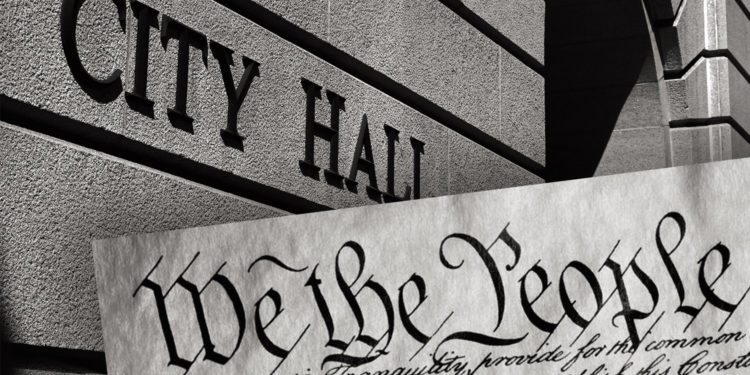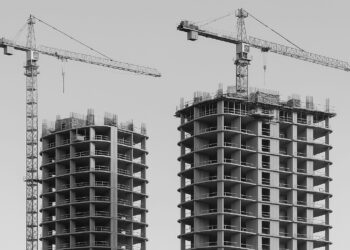The answer is: It depends. This seems to be a confusing or unsettling answer for many people, so it is valuable to consider how courts approach these questions, not just in times of emergency, but at all times.
Whether government action is constitutional is sometimes relatively straightforward: Can the government impose prior restraints on speech? Almost never. Can it discriminate on the basis of race? Same answer. But for most questions that involve a restriction on liberty, courts tend to ask two less direct questions in deciding whether it violates the constitution: What is the reason for the restriction? And how is the government going about it? Put another way: is the purpose legitimate and are the means chosen proper to achieving that goal? They are good questions for all of us to ask now.
Our government’s purpose, the Declaration of Independence tells us, is to “secure” our rights – to life, liberty, and the pursuit of happiness. Telling me I can’t go to work or can’t visit my neighbors surely qualifies as a deprivation of each. What then is the legal status of orders to stay at home to slow the spread of the novel coronavirus? Let’s look at it through the lens of the two questions.
First, is slowing the spread of the virus a legitimate use of government power? Protecting people from physical harm by others is one of the core reasons we have government. Infectious disease was well known to our constitution’s framers, and the purpose of quarantines — restricting the movement of infected and exposed people — is to stop infected persons from giving a serious disease to others. That is why, in a major 1905 case (Jacobson v. Massachusetts, involving vaccine laws), for instance, the U.S. Supreme Court said that a state’s “police power” legitimately includes such reasonable regulations as needed to “protect the public health.”
What about the second question: are stay-at-home orders an appropriate means of safeguarding public health? Here, the answer is more nuanced. Hence, “it depends.”
Some courts may strike down orders that go further than necessary or seem to be irrationally applied. Others will expect government officials to be explicit about the data or information they are relying on to maintain the extreme policies. We should, too.
The same U.S. Supreme Court decision quoted above also held that the government could not be “arbitrary and oppressive in particular cases” when using its police powers or else the courts must step in “to prevent wrong and oppression.” Throughout history, courts have struck down irrational or overbroad quarantine orders
For example, just last week, a federal trial judge enjoined the city of Louisville, Kentucky, from prohibiting “drive-up” church services on Easter Sunday. Parishioners would stay in their cars, observing social distancing practices mandated by public health officials. The judge said the city’s purpose was legitimate, finding that “society has the strongest interests in curbing the growth of a deadline disease.” Yet, he prohibited local officials from enforcing the policy because it was too broad and irrationally selective. Why stop drive-up church services, he noted, while continuing to allow drive-up liquor stores to operate? If the purpose is to promote social distancing, how is that advanced by preventing people from congregating from the isolation in their cars? The policy violated the First Amendment’s “free exercise of religion” clause because it was “not narrowly tailored” to advance the government’s purpose.
This kind of reasoning is nothing new. In 1900 (in Jew Ho v. Williamson), a federal appellate court struck down a quarantine order that locked-down San Francisco’s Chinatown aimed at stopping an outbreak of bubonic plague. In a scenario reminiscent of today’s shutdown orders, a grocer whose business was threatened with destruction by the quarantine sued because his customers couldn’t come to shop, and he couldn’t work.
Again, the court noted that quarantines are legitimate to stop the spread of disease, but that this one was “unreasonable, unjust, and oppressive,” and therefore in violation of the U.S. Constitution. It was an “unscientific” quarantine, based on bad information about the existence of the outbreak and the way that bubonic plague spreads. Moreover, “persons of the Chinese race” were restricted while people of other races could come and go. The discriminatory enforcement belied the government’s assertion that a quarantine was needed or effective.
California’s blanket order affects tens of millions of people without distinguishing between infected, exposed, or healthy people, over a massive territory. It is unlike any quarantine in American history.
So, what to make of California’s mandate, mirrored now by many other states and local governments, declaring that “all residents [of the state] are directed to stay home or at their place of residence” with some exceptions “until further notice” to slow the spread of COVID-19? This blanket order affects tens of millions of people without distinguishing between infected, exposed, or healthy people, over a massive territory. It is unlike any quarantine in American history.
Extreme uncertainty was used to justify the extreme action: At the beginning of this crisis, there was little data available, but some possibility of millions of additional deaths if draconian measures were not immediately imposed. The view was that the disease was easily communicated, spreading unpredictably, and very lethal, giving the benefit of the doubt to the government’s response.
Nonetheless, the longer the lockdowns go on, the more cases are likely to be filed challenging applications of the stay-at-home orders in particular factual contexts. And courts are likely to begin demanding answers to the problematic question: are the continuing means chosen by government officials to slow the spread proper to achieve that end?
Some courts, like the “Easter Sunday” case above, may strike down orders that go further than necessary or seem to be irrationally applied. Others will expect government officials to be explicit about the data or information they are relying on to maintain the extreme policies. We should, too.
Most of all, we should demand that government officials spend their time collecting and presenting the best available information to the public, encouraging testing, and experimenting with less restrictive means of advancing public health. The current state of emergency is justified by uncertain risk. If officials continue shutting businesses down and telling everyone to stay home without taking every reasonable step available to resolve the uncertainty, they will – and, indeed, should – face skepticism and even outrage
Finally, are the shutdown orders constitutional? The simple answer is that courts will likely uphold them in the current climate of extreme uncertainty, reluctant to second-guess executive officials acting to stem an emergency. But should courts rule that way? The government’s job is to protect our rights. As time goes on, whether the orders are constitutional should turn on whether the government is able to show that its actions are actually protecting people rather than merely controlling them.









Beyond the spectacle, Kansas City prepares for World Cup reality